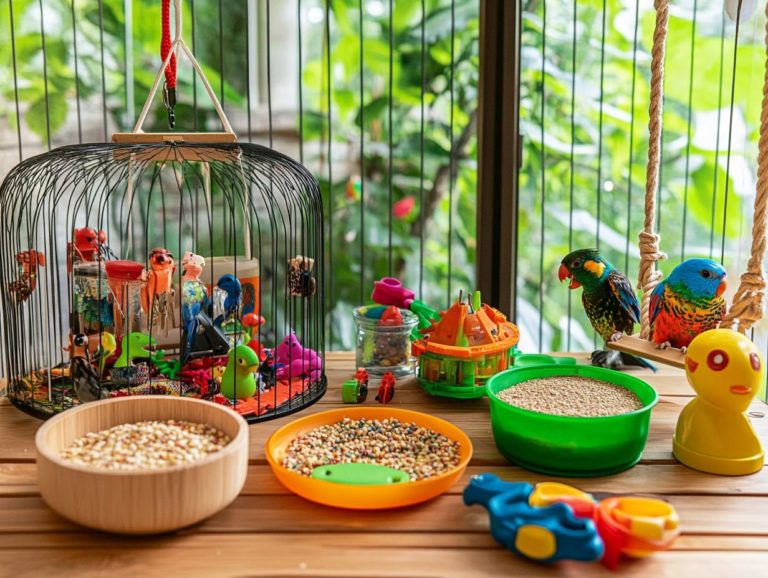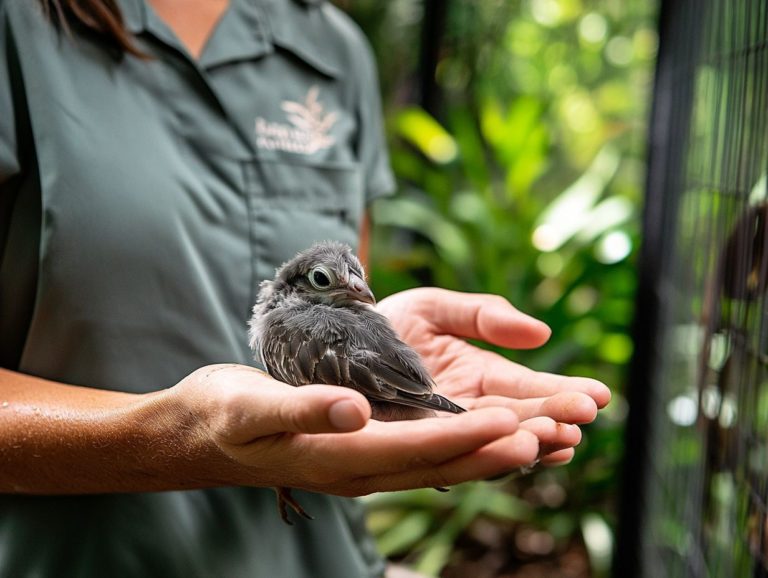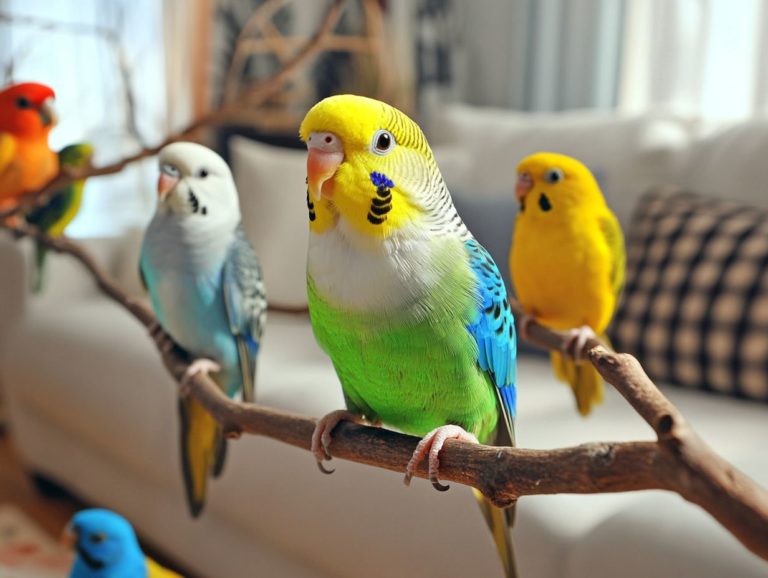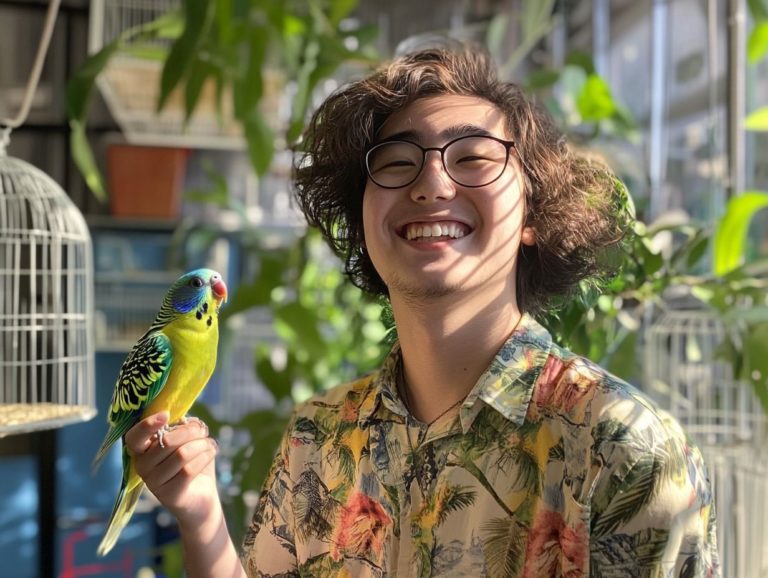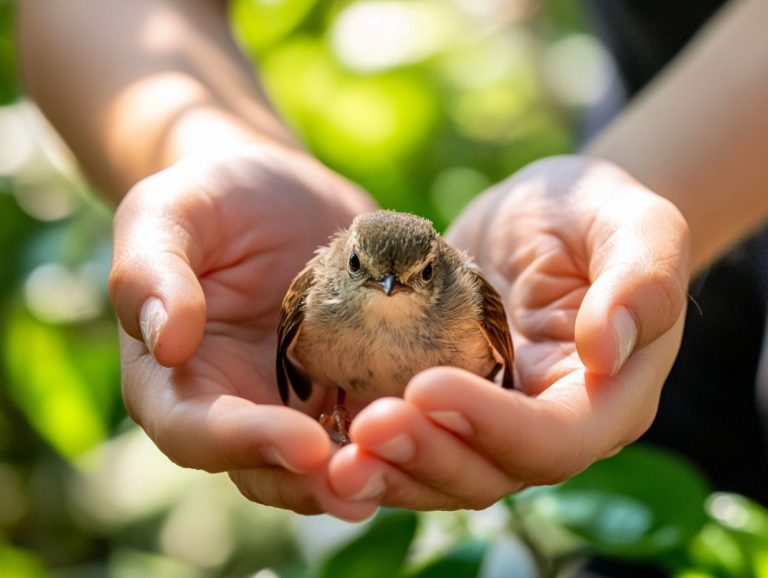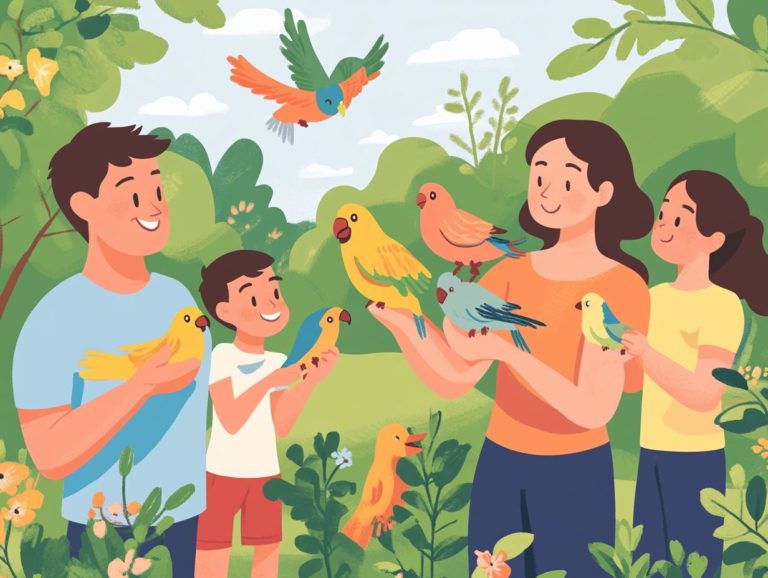5 Steps to Take After Adopting a Bird
Bringing a new bird into your home marks the beginning of an exhilarating journey, one brimming with joy and companionship!
However, it also entails responsibilities that can significantly impact your bird’s happiness and well-being. Get ready to explore five essential steps to help your new pet acclimate to its surroundings, covering everything from preparing your home to nurturing a strong bond!
You will discover what to expect along the way and how to navigate common challenges. Keep reading to make sure your bird feels right at home and ready for adventure!
Contents
- Key Takeaways:
- 1. Prepare Your Home for Your New Bird
- 2. Introduce Your Bird to Its Cage and Environment
- 3. Establish a Routine for Your Bird
- 4. Socialize and Bond with Your Bird
- 5. Keep Up with Regular Veterinary Check-Ups
- What to Expect When Bringing Home a New Bird?
- What Are the Essential Supplies for a New Bird?
- How Can You Help Your Bird Adjust to Its New Home?
- What Are Some Common Behavioral Issues in Newly Adopted Birds and How to Address Them?
- How Can You Create a Safe and Stimulating Environment for Your Bird?
- What Are Some Tips for Building a Strong Bond with Your Bird?
- Frequently Asked Questions
- What are the 5 steps to take after adopting a bird, especially if it s a rescue?
- How do I set up a suitable living space for my newly adopted bird, such as a Cockatiel or Lovebird?
- How can I bond with my newly adopted bird, including pets like Finches or Budgies?
- What should be included in my bird’s daily routine for optimal health and well-being?
- What type of nutrition does my bird require?
- When should I seek medical care for my newly adopted bird?
Key Takeaways:
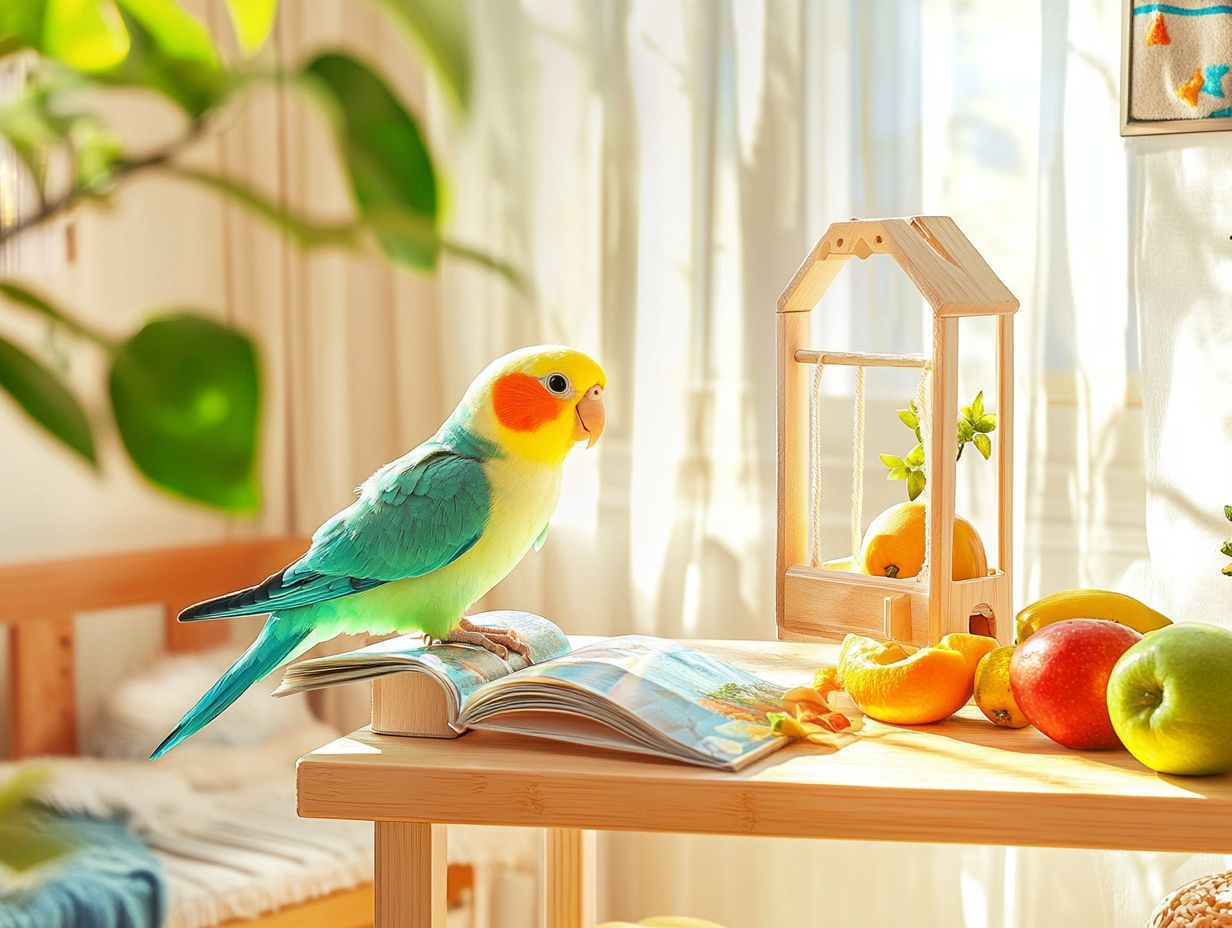
- Bird-proof your home and create a cozy cage that meets your bird’s needs.
- Introduce your bird to its cage slowly and establish a routine to help your bird feel secure.
- Socialize and bond with your bird by spending daily one-on-one time and providing mental stimulation.
1. Prepare Your Home for Your New Bird
Preparing your home for a new bird, especially a macaw or another exotic pet like an African Grey, requires creating a safe and nurturing environment. This thoughtful preparation fosters a positive bond as your bird settles in. By enhancing your bird’s safety and comfort, you ensure that your living space accommodates their natural behaviors and interactions.
To effectively pet-proof your home, secure hazardous items like:
- cleaning supplies
- electrical cords
- small objects that could pose a choking hazard
Establishing safe spaces will help your bird feel secure and reduce stress. For macaws, having the right cage is crucial; it should be spacious enough for movement and play.
Invest in high-quality toys that stimulate both physical and mental exercise. Providing activities that keep your bird happy and active is essential. Think climbing opportunities and varied perches! Additionally, ensure proper lighting and temperature control for a comfortable living space for your vibrant creature.
2. Introduce Your Bird to Its Cage and Environment
Introducing your bird to its cage is vital for a smooth transition. This space becomes their sanctuary, providing safety as they acclimate and establish trust with you.
To make the cage inviting, incorporate familiar toys and perches that offer comfort and stimulation. Use a variety of textures and colors to pique their curiosity and inspire playfulness!
Be strategic in positioning these elements, ensuring ample room for movement and exploration. Creating a welcoming atmosphere demands your patience.
Gradual introductions allow your bird to adapt to their new environment. For more insights, check out our guide on how to prepare for bird adoption day. Each small step fosters their confidence, helping them feel secure in their new home.
3. Establish a Routine for Your Bird
Establishing a routine for your new bird is key to fostering a sense of normalcy and security. A predictable schedule that includes feeding, social interactions, and training sessions nurtures their health and well-being, as outlined in our guide on how to create a safe space for your adopted bird.
A consistent feeding schedule ensures your bird receives necessary nutrients while reinforcing their trust in you as a caregiver. Monitor their diet, incorporating high-quality pellets alongside a delightful array of fresh fruits and vegetables to keep mealtime interesting and nutritious!
Playtime is equally vital; it encourages physical activity and allows your bird to develop social skills. Regular training routines further enhance your bond, transforming learning into a fun experience. Together, these practices cultivate a strong companionship, making your bird feel secure and cherished.
4. Socialize and Bond with Your Bird
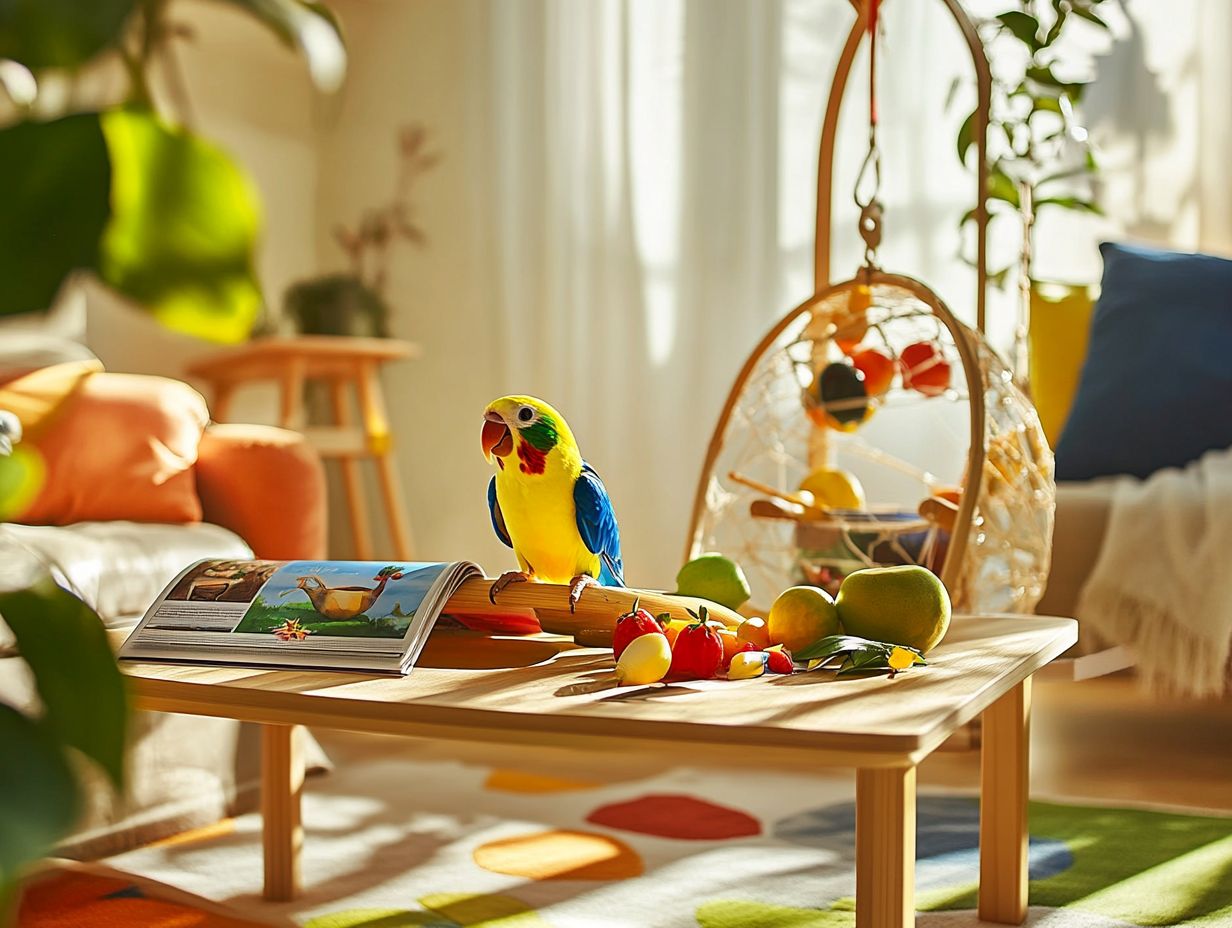
Bonding with your bird is a rewarding journey. It takes patience and understanding, but this effort builds a deep companionship.
Engaging in structured playtime creates a routine that your feathered friend quickly learns to anticipate. This cultivates a reassuring sense of security. Gentle handling is just as important; it should foster trust instead of fear. Watch for signs like relaxed body posture or head-bobbing, which indicate your bird feels comfortable and content.
These subtle cues signal that you re on the right path in building your bond. Consistent social interaction enhances positive behaviors and plays a significant role in your bird’s mental well-being. This encourages them to express their playful and affectionate nature more freely.
5. Keep Up with Regular Veterinary Check-Ups
Don t wait! Regular vet visits are crucial for your bird’s health. They ensure timely vaccinations and help catch issues before they become serious.
By finding a veterinarian who specializes in bird care, you gain access to the expertise needed for your feathered friend. During these visits, veterinarians perform thorough examinations that assess feathers, beak condition, weight, and provide tailored recommendations for an optimal diet and environment.
These regular assessments help you identify subtle changes or signs of illness early on. They also cultivate a trusting relationship between the vet, your bird, and yourself. This proactive approach keeps you informed about your pet s behavior and overall well-being, leading to a happier, healthier life for your avian companion.
What to Expect When Bringing Home a New Bird?
Welcoming home a new bird can feel overwhelming, but remember that patience pays off! This experience can be incredibly fulfilling, especially when you learn how to bond with your newly adopted bird, but it often comes with challenges. As your bird settles into its new environment, it will undergo a period of adjustment that shapes its personality and behaviors.
During this phase, your newly rehomed bird may show a range of emotions, from anxiety and fear to curiosity and excitement. This emotional rollercoaster can lead to changes in behavior, including reluctance to interact or unexpected exploratory actions that might catch you off guard.
It s essential to provide a calm environment and gently encourage interaction. Over time, the bond will strengthen, allowing your bird to feel secure and truly at home.
What Are the Essential Supplies for a New Bird?
Gather key supplies before your new bird arrives! Start with a spacious, secure cage for your feathered friend.
A nutritious diet is essential. Offer a mix of pellets, fresh fruits, and veggies for overall health. Stimulating toys will keep your bird engaged both mentally and physically, ensuring safety and comfort in this new environment.
For larger birds like macaws, providing a sturdy cage with ample space is vital. Their size demands room to move, stretch, and play freely. Ensure you offer a variety of fresh fruits and vegetables to meet their nutritional needs and add excitement to mealtime.
If you have an African Grey, known for its remarkable intelligence, provide a diverse selection of safe toys that encourage problem-solving and engagement. Incorporating perches made from various materials can enhance their environment, promoting essential exercise and reducing stress.
Ultimately, understanding the specific requirements of your bird, whether it’s a Cockatiel or a Lovebird, will pave the way for a happy and healthy life together.
How Can You Help Your Bird Adjust to Its New Home?
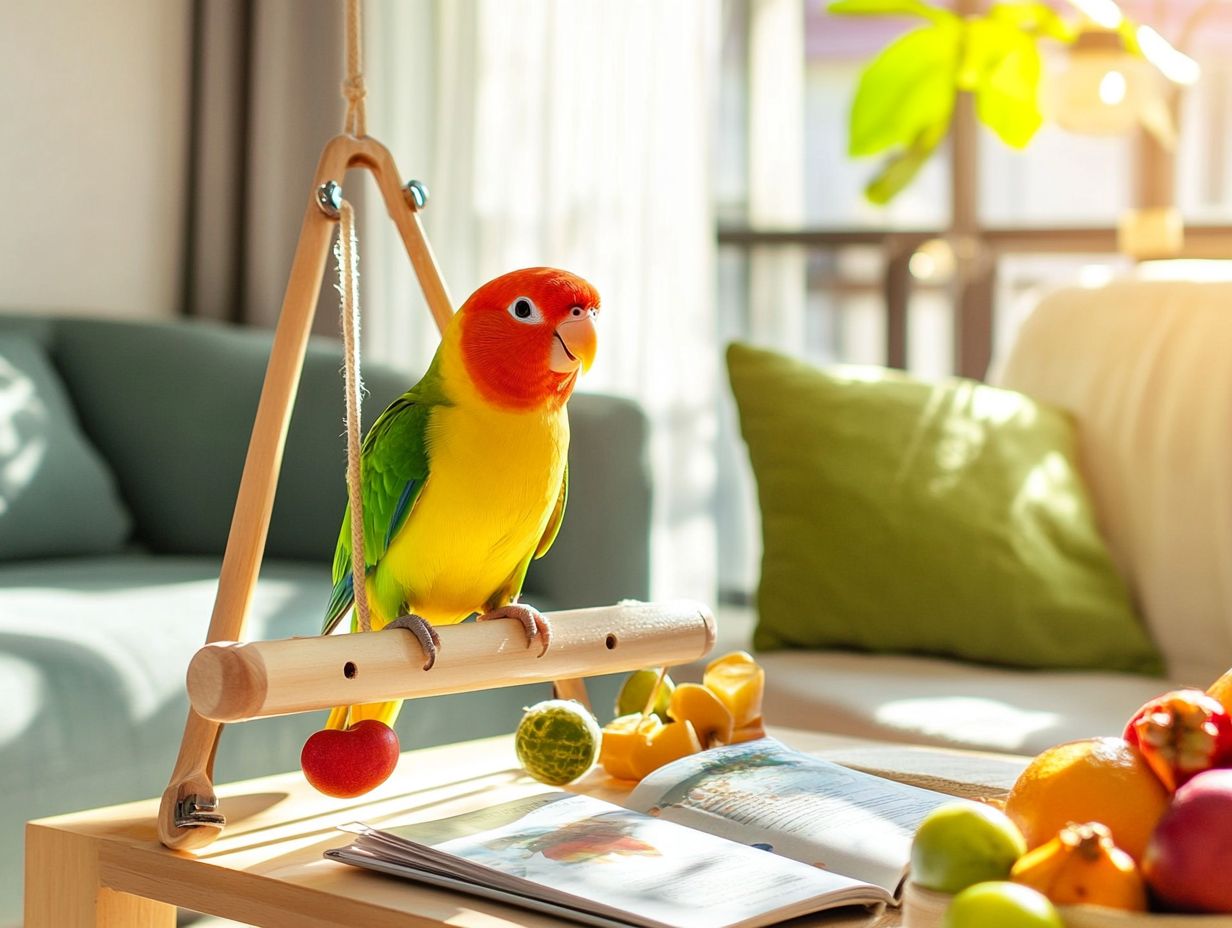
Helping your bird adjust to its new home means creating a calming environment, fostering open communication, and ensuring safety. For more on this, explore 5 ways to make your adopted bird feel at home, as these are vital for your bird’s comfort and trust.
Establish a quiet space away from daily hustle. This allows your bird to explore its surroundings and feel secure. Include familiar items like toys or a cherished blanket to help it feel at home.
Watch for signs of adjustment. Vocalizations or changes in eating habits can show your bird’s emotional state. To ensure a smooth transition, consider the essential care for adopted parrots by introducing new experiences gradually while keeping their comfort in mind.
What Are Some Common Behavioral Issues in Newly Adopted Birds and How to Address Them?
Newly adopted birds may display behavioral issues like anxiety, vocalization, and stress. These behaviors often stem from past experiences, but with the right approach, you can implement socialization tips for newly adopted birds to help them adjust.
To address these concerns, implement a consistent training routine. This will help your bird feel secure and reduce anxiety.
Provide plenty of socialization opportunities. With patience and positive reinforcement, you can build a stronger bond with your bird.
How Can You Create a Safe and Stimulating Environment for Your Bird?
Creating a safe and stimulating environment requires careful pet-proofing, engaging toys, and interaction opportunities. This is crucial for your bird’s well-being.
-
Inspect your living space for hazards like electrical cords and toxic plants. Secure or remove these items for your bird’s safety.
-
Design an enriching cage setup with stimulating toys and perches. Research your bird species for specific needs.
-
Provide time outside the cage for social engagement and supervised exploration.
Regular playtime and mental challenges deepen your bond and keep your bird entertained. A balanced diet of pellets, fruits, and vegetables contributes to their overall health.
What Are Some Tips for Building a Strong Bond with Your Bird?
Building a strong bond with your bird is an exciting adventure that requires consistent interactions, positive reinforcement training, and a hefty dose of patience. This effort will ultimately lead to a deep companionship that enriches both your lives.
To foster this connection, consider employing gentle handling techniques that make your bird feel secure and safe in your presence. Incorporating fun training tricks not only stimulates your bird s mind but also creates joyful moments that enhance your relationship.
Setting aside quality time for playful interaction whether it’s exploring new toys or engaging in gentle play can significantly boost trust and affection.
Understanding your bird’s unique personality and needs is also important; this understanding paves the way for a harmonious partnership founded on mutual respect and love, especially during the early stages of rehoming. For more insights, check out how to give your adopted bird a happy home.
Frequently Asked Questions
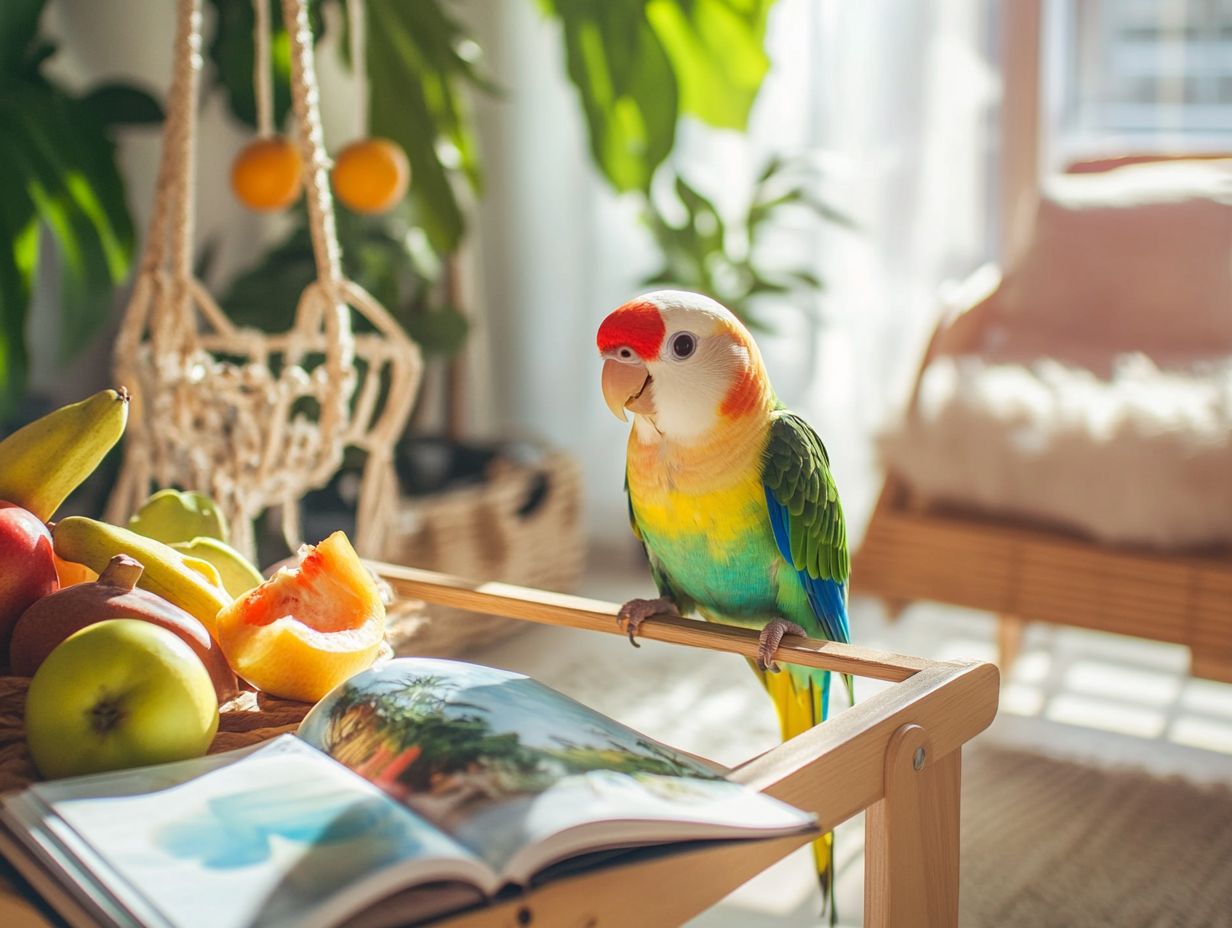
What are the 5 steps to take after adopting a bird, especially if it s a rescue?
- Set up a suitable living space.
- Build friendship with your bird.
- Establish a daily routine.
- Provide proper nutrition, including a variety of seeds and pellets.
- Seek medical care.
How do I set up a suitable living space for my newly adopted bird, such as a Cockatiel or Lovebird?
It is important to provide your bird with a spacious, safe, and stimulating living space. This includes a large cage with appropriate perches, toys, and food and water dishes.
How can I bond with my newly adopted bird, including pets like Finches or Budgies?
Building friendship with your bird is essential and requires patience and time. Spend time talking to your bird, offering treats, and gradually introducing handling and training techniques such as fun tricks to foster a stronger connection.
What should be included in my bird’s daily routine for optimal health and well-being?
A daily routine is important for your bird’s physical and mental well-being. This should include regular feeding, cleaning, playtime, and social interaction with you.
What type of nutrition does my bird require?
Proper nutrition is crucial for your bird’s health and longevity. Consult with a veterinarian to determine the best diet for your specific bird species, including a variety of seeds, pellets, fruits, and vegetables.
When should I seek medical care for my newly adopted bird?
It is important to establish a relationship with an avian veterinarian and schedule regular check-ups for your bird. If you notice any changes in behavior, appetite, or physical appearance, seek medical care immediately.

